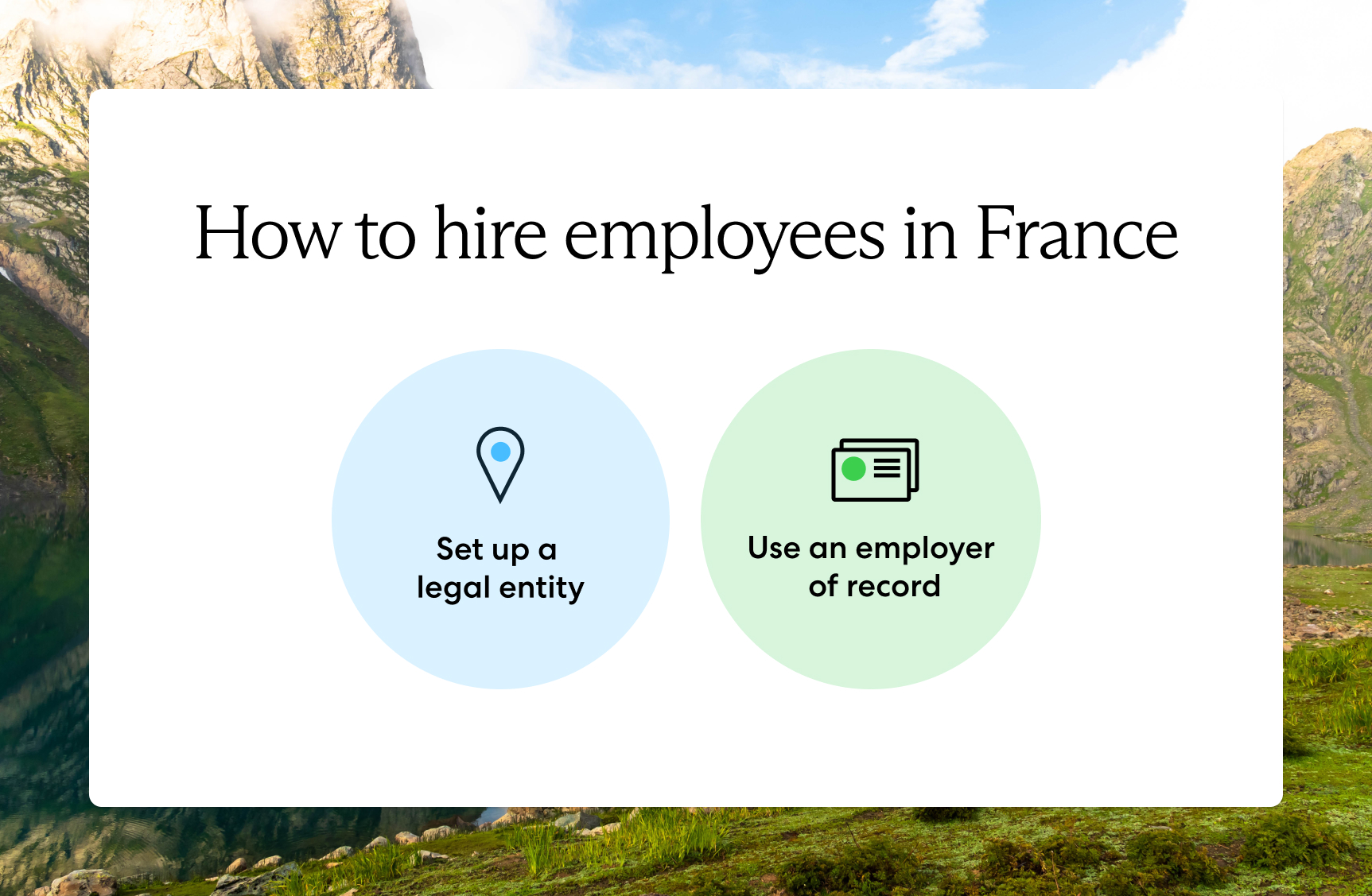With a highly skilled talent pool and the second largest economy in the EU, France is an ideal target market for global companies looking to diversify their workforce while expanding into the European single market.
Still, France’s employee-friendly labor regulations pose unique risks for foreign employers. For instance, navigating the French Social Security system and ensuring compliance with its varying contribution rates can create major headaches for HR and finance teams.
This guide outlines everything you need to know about hiring employees in France and provides key tips on mitigating risk. Plus, find out how to quickly and compliantly hire employees in France without establishing a local entity.
How do you employ people in France?
To employ people in France, global companies must submit form E0 and a pre-employment statement (DPAE) to URSSAF, France’s social security body. Next, they must complete the standard employment formalities, such as signing their work agreement, arranging medical examination for their new hire, and incorporating the new hire into the company payroll.
Keep in mind that global companies must also establish a local legal entity to hire employees in France. However, if entity establishment doesn’t align with your plans for expansion, partnering with a global employment organization, such as an employer of record (EOR), can serve as a convenient workaround.
Hiring employees in France: 2 options
Global companies have two options for hiring employees in France: setting up a local entity or partnering with an employer of record (EOR).
While entity establishment facilitates direct hiring and reduces risk exposure, it’s a costly and time-consuming endeavor that only makes sense under particular circumstances. On the other hand, partnering with an EOR allows you to quickly and compliantly engage French talent from anywhere without making long-term investments.
We discuss each option in detail below.
Set up a legal entity in France
If you plan to establish a long-term presence in France and build a sizeable local team, undergoing entity establishment may be the best approach for your business.
With a legal entity, you can create a local branch, hire talent directly, and handle all employment logistics internally, from hiring and onboarding to running payroll, administering benefits, and ensuring compliance. In some cases, entity establishment also opens doors to local tax benefits.
However, this approach requires extensive bandwidth, capital investment, and in-country knowledge of French employment regulations. Plus, entity establishment is costly and time-consuming, requiring a long-term financial commitment.
Unless you’re ready to make long-term investments in the French market, entity establishment is often more trouble than it’s worth.
Partner with an employer of record (EOR)
If you don’t have the resources to undergo local incorporation, or you aren’t ready to make long-term investments in the French market, consider partnering with an EOR.
An EOR is a third-party entity with global infrastructure and international legal expertise that makes it easy for global companies to quickly and compliantly hire across borders without establishing entities.
By partnering with an EOR, you can streamline every aspect of international hiring. In addition to managing employment contracts and ensuring compliant onboarding, a French EOR runs global payroll, crafts competitive employee benefits, mitigates risk, and provides ongoing HR support for your French team on your behalf.
An EOR also handles immigration and visa procedures should you need to hire a foreign national or relocate talent from your home country to France.
This approach is ideal for global companies interested in quickly building a distributed team in France without the added headache of navigating local employment regulations or making long-term investments in the French market.
Learn more: What Is an Employer of Record (EOR)?
Engaging contractors in France
A third option for global companies interested in building a distributed workforce in France is to hire French contractors. However, this approach comes with added risk and drastically limits your growth potential.
Hiring international contractors offers global companies the flexibility to work with talent on short-term or specialized projects. This approach also helps employers save time, money, and other resources they would otherwise invest in hiring, onboarding, and running payroll for full-time employees.
Still, engaging international contractors poses a serious misclassification risk. While French worker designations may seem black and white at first, the law includes grey areas that foreign employers can easily overlook and end up in a world of legal trouble.
Even well-founded global companies unknowingly violate worker classification laws in foreign markets and face serious penalties. For instance, the Conseil des Prud'hommes civil court in Lyon, France, recently found Uber guilty of misclassifying 139 employees as contractors, forcing the company to pay US$18 million in damages and back pay.
Worker classification laws vary from country to country. Still, they typically depend on factors like the worker’s financial relationship with the client and the degree of control the client maintains over the contractor’s work, leaving room for interpretation.
We discuss misclassification risk in greater detail later on.
Learn more: Should You Hire a Contractor or an Employee?
How much does it cost to hire an employee in France?
The cost of hiring an employee in France is, on average, roughly 45% of an employee’s base salary due to mandatory employer contributions to social security in France.
In addition to social security contributions, employers must also contribute 6.26% or 14.82% of their employee’s monthly earnings to a supplementary pension called Agirc-Arcco based on their employee’s income.
Still, total employee cost in France varies widely based on additional factors like the number of employees hired, entity type, and applicable collective bargaining agreements (CBAs).
Interested in hiring employees in France? Use our employee cost calculator below to get reliable insights into employee costs and payroll contributions in France:
How does employment work in France?
French employment practices are similar to those of other European countries, with some unique differences. A standard work week in France is 35 hours, and overtime amounts to 150% of regular pay. Employees also enjoy 25 days of paid annual leave, plus other entitlements, such as paid sick leave and the right to disconnect.
Below, we summarize the standard employment practices that all global companies operating in the French market should know:
- Working hours. A standard work week in France is 35 hours, or seven hours per day, with a maximum of 48 hours per week, including overtime.
- Probationary period. The maximum probationary period in France is two to four months, depending on the employee's position and relevant CBA provisions.
- Annual leave. Employees receive 25 days of paid annual leave, although CBA provisions may require more.
- Sick leave. Qualifying employees receive paid sick leave for up to three years at 50% of their regular pay.
- Maternity leave. Qualifying mothers receive 16 to 46 weeks of paid maternity leave depending on the number of children they had before their pregnancy and whether or not they give birth to twins or triplets.
- Paternity leave. Fathers receive 28 days of paid paternity leave upon the birth or adoption of a child or 32 days in the case of twins or triplets.
- Termination. Standard notice periods in France vary from one to three months, depending on applicable CBA provisions. Employers may also provide pay in place of notice.
- Severance. Severance pay consists of one-fourth of the employee’s monthly salary for each year of service for the first 10 years and one-third of the salary for each additional year. CBA provisions may require more.
- Right to disconnect. The right to disconnect regulates the employer-employee relationship, separating the employee's work sphere from their personal sphere. The law most notably limits an employer’s ability to contact employees outside of working hours.
- Public holidays. Employees in France enjoy 11 non-working annual public holidays, plus applicable regional and departmental holidays. Federal law mandates payment only on May Day, leaving compensation on other public holidays up to employers and CBAs.
Remember that CBA provisions cover 95% of employees across all industries in France, often supplementing the rules of the Labor Code with more generous mandates in areas like paid leave, parental leave, and medical coverage.
Individual work agreements cover the remaining points that the Labor Code and respective CBAs don’t cover. As a result, employers in France must comply with many statutes at various levels of governance.
Compliance risks when hiring employees in France
Due to the complex and interconnected nature of France’s Federal Labor Code and CBA provisions, foreign employers often struggle to navigate French employment regulations on their own.
Global companies' primary compliance risks when hiring employees in France involve payroll contributions, misclassification, permanent establishment, and immigration requirements. We discuss each of these in detail below and offer tips for mitigating risk.
Incorrect payroll contributions
France’s unique payroll tax and contribution system poses a serious compliance risk for global companies new to operating in the French market. Complex payroll regulations also make it difficult for employers to forecast accurately and budget employment costs.
Employer contributions to the French Social Security system amount to roughly 45% of the employee’s gross monthly salary. This contribution accounts for health insurance, workers’ compensation, unemployment insurance, childcare allowance, and retirement benefits.
Plus, the federal government assesses contribution rates based on various factors, such as team size and entity type, and imposes contribution ceilings on specific programs. CBA provisions also impact Social Security rates. As a result, employer and employee contribution rates vary drastically.
Foreign employers must practice due diligence to ensure they run compliant, accurate, and timely payroll for their French team. Many global companies operating in the French market rely on a third-party expert, such as an EOR, to mitigate this risk.
Learn more: Payroll and Tax in France: An Overview for Global Employers
Misclassification
Misclassification risk is a major concern for companies that hire French contractors instead of full-time employees. Worker classification laws in France are similar to those of other countries—they are nuanced and leave room for interpretation.
Correctly classifying contractors in France largely depends on the degree of influence a client has over its contractors’ daily duties. French regulators measure this influence based on various factors, including the following:
- The exclusivity of the client-contractor relationship
- The degree of control the client has over the individual’s work
- Whether or not the individual supplies their own work equipment and tools
- The degree of financial risk that an individual carries when completing a project
- The degree of integration between the client’s business and the individual’s activities
Plus, classification regulations and workplace dynamics often change, creating an added risk if your HR team doesn’t conduct regular audits.
Suppose your work agreement with a French contractor doesn’t provide any of the benefits associated with employment. Your contract also doesn’t establish a regular payment structure or an exclusive relationship with them.
Still, if you provide that contractor with work equipment, such as laptops or other tools, and stipulate when they should be online for work, you risk establishing an employer-employee relationship with them under French employment regulations. As a result, your company may face employee back pay, tax arrears, and other misclassification penalties.
Navigating French classification regulations requires an experienced legal team with expertise in French employment law. Your team must have the time and resources to conduct regular audits to ensure compliance.
Alternatively, many global companies seek legal counsel from a local, third-party expert to handle worker classification on their behalf and eliminate risk.
Learn more in our complete guide to employee misclassification.
Permanent establishment
When doing business in any capacity in a foreign country, global companies risk triggering permanent establishment status and subjecting themselves to local corporate taxation.
Generally speaking, if a company operates with a fixed presence in a country and generates revenue there, it has permanent establishment status. However, many companies often overlook what constitutes a fixed presence.
French law clearly states that any foreign company that does business in any of the following three ways establishes a fixed presence in the country and has permanent establishment status:
- Physical establishment. This refers to doing business in France through a physical location, such as a local branch or sales office.
- Dependant agent. This refers to doing business in France remotely through a dependent local agent.
- Commercial cycle. This refers to establishing a complete commercial cycle in France, including purchase and sale transactions, manufacturing and sale transactions, and leasing transactions.
By hiring employees in France, global companies risk triggering permanent establishment and subjecting themselves to local corporate taxation. Clarifying your permanent establishment status as you build a distributed team across France is critical for avoiding fines and litigation.
Immigration regulations
Most of the talent you hire in France will be French citizens or residents who don’t require visas or permits to live and work in the country legally.
Still, global mobility is no longer an exception in today’s world of remote work. At some point, you may need to hire a foreign national in France or relocate an employee from your home country to France.
No matter the situation, your HR team must have the necessary resources and skills to navigate French immigration procedures and determine which visas and permits your team needs to reside and work in France legally.
In most cases, you’ll have to cooperate with your new hire and local authorities to secure the needed documents, such as your work agreement and completed visa application forms, and submit a separate application for a work permit.
Having an experienced HR team that can swiftly navigate immigration and visa procedures ensures you can build an agile, distributed team ready to grow with your company, regardless of your next steps.
Compliantly hire employees in France with Velocity Global
Hiring employees in France offers global companies unique growth opportunities, but complex local employment laws create serious compliance risks. Fortunately, an experienced partner like Velocity Global can simplify the process.
With international legal expertise and access to global infrastructure, our EOR solution makes it easy for global companies to quickly and compliantly hire talent in over 185 countries, including France, without establishing legal entities.
We handle the heavy lifting associated with building global teams, from hiring, onboarding, and running compliant global payroll to administering global benefits, ensuring compliance, and offering ongoing HR support to your team. With Velocity Global at your side, you can source top local talent and build your dream team in France without skipping a beat.
Contact us today to learn how to quickly and compliantly hire employees in France from anywhere.
Topic:
Country Guides




